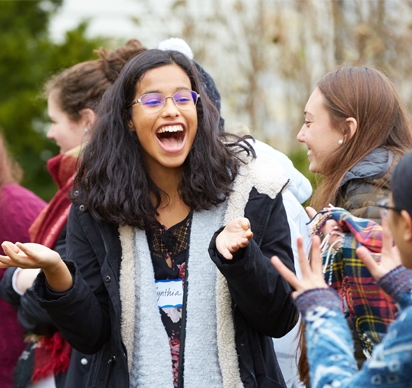Middlebury Students Share Lessons of Global Awareness and Cultural Competency with Area High Schoolers

Slide Show
[view:embed_content==560249]
MIDDLEBURY, Vt. – Seventeen students from Rutland High School gained a measure of global awareness after connecting with four international students at Middlebury College for a half-day of activities, conversation, and pizza and salad.
The college students from Brazil, Brunei, Kenya, and Vietnam engaged the high schoolers in ice-breaker activities on the lawn in front of the Center for Community Engagement (CCE), and encouraged the Rutland youngsters to open up during conversations about cultural differences, stereotyping, and public education.
The get-together was planned by Kristen Mullins, the program coordinator for CCE’s Language in Motion program, who said that “taking perspective on our own experiences” is central to gaining cultural competency.
“One thing we are always trying to do in helping others develop cultural competence is to encourage them to postpone making judgments, to pause, to try and understand what is happening, and to avoid the tendency to rush toward evaluation,” said Mullins, who joined the Community Engagement staff as an assistant director in 2014. “Our perceptions are culturally influenced. What we see, what we notice, and what we remember is based upon our own experiences.”
Referring to both Middlebury students and students at area public schools, Mullins added: “Helping students to pause and consider what they are really saying and what they are experiencing, and why they take away what they do from a situation, is fundamental to supporting the development of their cultural competence.
At one point, the Middlebury students who led the afternoon’s activities – Mary Baillie ’18 from Brunei, Da Thi Hoang ’20 from Vietnam, Sam Kamau ’21 from Kenya, and Cynthia Da-Silva Ramos ’21 from Brazil and Texas – talked about the stereotypes most often connected with their home countries. Then, they turned the conversation around and asked the high school students to list some stereotypes about Vermonters in general and Rutland residents in particular.
As Sam Kamau pointed out, stereotypes are “oversimplified or generalized ideas about a person or a group,” and more often than not they are untrue. Stereotyping has a negative effect on the people being targeted, and it disregards the fact that “each person is an individual with [his or her] own beliefs.” As the high school students examined different stereotypes, it began to dawn on them how hurtful stereotyping really is.
After the session, Kamau said, “I think the students from Rutland gained a much broader perspective on the cultural practices of people living outside the United States.” He also was pleasantly surprised to learn that some of the visiting students from Rutland are working on a case study about Kenya for their Model United Nations Project – a project that he is now going to assist them with.
Thi Hoang acknowledged that a few hours “are not enough time to learn fully about other cultures,” but that the day’s exercise “familiarized the students with some countries they might have never heard about before, and, more importantly, they have started to think about how and why there are differences across cultures, and what each of us should do with these differences.”
The sophomore from Vietnam added: “We did not come to the presentations to ‘cleanse’ our countries of stereotypes. Instead, we wanted the students to think critically as to how stereotypes not only negatively affect a minority but also themselves as Rutland high school students, as Vermonters, and as Americans.”
One of the high school teachers who accompanied the students to Middlebury said she was “happy to see the students so fully engaged throughout the event,” including the amount of time spent in “unstructured and unfacilitated conversation” with the international students.
Social studies teacher Claire Groby, who graduated from Middlebury College in 2008, observed that the presentation on stereotypes “helped the students really understand what a stereotype is and why it is so damaging. I also thought it was great that they were getting this message from other young people,” and not just from their teachers or parents.
The lessons learned from their day at Middlebury went beyond the basic message of “don’t stereotype,” Groby commented a few days after the event. “The students thought the key messages also were the importance of learning about others, that other cultures are interesting, and that they are grateful for the opportunities they have at school in Rutland.”
The Language in Motion program at Middlebury College is supported in part by a grant from the Arthur Vining Davis Foundation, and it is primarily focused upon training and supporting college students to develop and deliver lessons in the community that will promote global awareness, cultural competence, and the acquisition of world languages.
Middlebury is one of 14 colleges in the Language in Motion Consortium, which includes the founding institution Juniata College, in addition to Dartmouth, Vassar, Bryn Mawr, Lewis & Clark Colleges, Iowa State University, and others.
Reporting by Robert Keren; Photos by Todd Balfour

